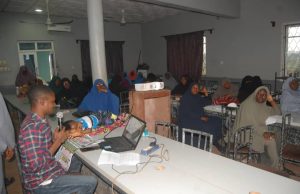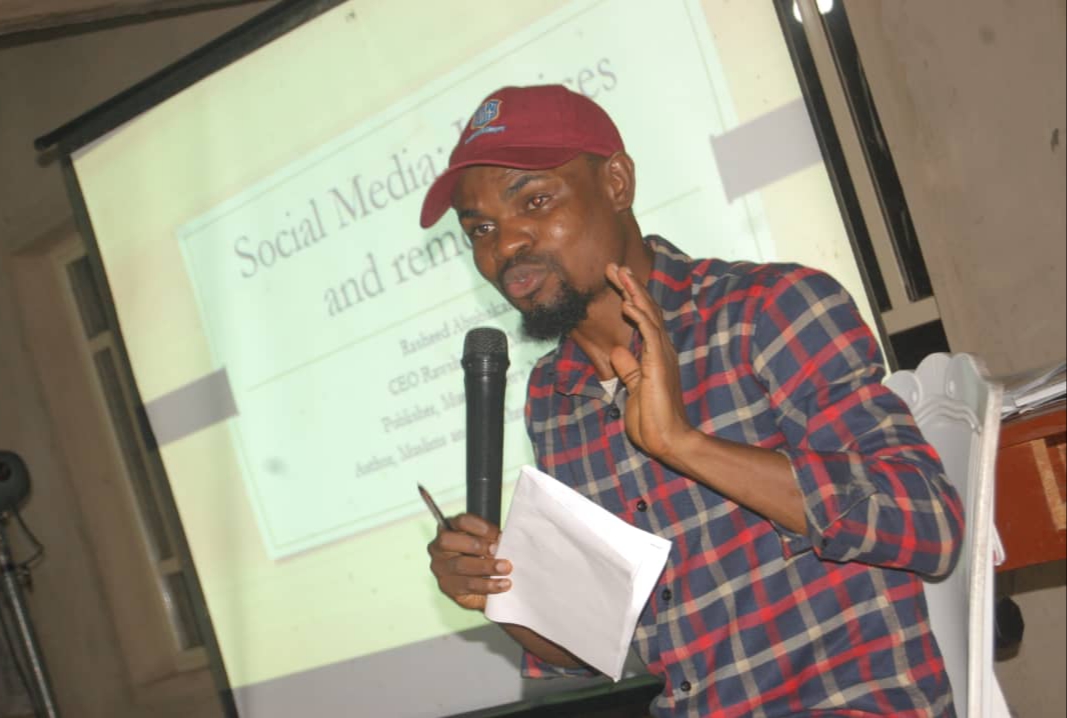The need for Muslim organisations in Nigeria to use media (print, broadcast and social media) to propagate the comprehensiveness of Islam and influence public’s perception about its tenets was the subject of discourse over the weekend at a media summit held at Vanguards Academy, Odosengolu, Ijebu-Epe road, Ogun State.
Media scholars who graced the summit with the theme; mirroring our mission through the media, wither our opinions, tasked Muslim women from different Islamic organisations to make the best use of the media by speaking out to express their opinions on matters that affect Islam and its tenets in a civilised manner.
In recent times, Muslim women have been faced with a plethora of challenges in Nigeria including the incessant harassment over the use of Hijab and often, only few of these harassed persons use the media to demand for their rights.
In the first presentation, titled, ‘Social Media: Opinion Moulding and Management for our Mission’, the publisher of Muslim News, Mal. Rasheed Abubakar said it has become necessary for Muslim women to develop social media consciousness and capacity to join their male counterparts in the use of the platform to propagate Islam and the activities of their organisations.
Abubakar said Muslim Women organisations in this age of modernity must maintain active and engaging social media presence that will be handled by competent administrators to spread the comprehensiveness of Islam and contribute their voices to matters that affect Islam in a civilised manner.
“There are 7.7 billion people in the world according to a recently released statistics by Our World in Data and it is interesting to know that about 3.5 billion people are online. Facebook alone has 2.5 billion,” the CEO Rawshield PR Media stated, adding that, “about half of the world population are online. We must therefore be ready to spread and share the comprehensiveness of Islam with them through all the social media platforms.
While highlighting the steps, the author of ‘Hijab and the Nigerian Press’ noted, “Social media is an efficient tool for change and influence of public opinion. We must take advantage of these platforms for our da’awah. Our social media handles must be active and functional.
“Our social media handles should not be used to join football, jokes or other irrelevant groups or discussions; they should not be used to spread unnecessary information of the organisations that are not meant for the general public. They should not be handled by part-time handlers or someone who does not understand the mission and vision of the organisations. They must get competent personnel.”
He also noted that apart from the group platforms, individuals should activate their personal social media profiles to advocate for Muslim rights and counter misinformation about Islam and their organisations with the use of hashtags.
According to him, “We should get all our members, male and female, including students, to dominate all social media platforms and use them to promote Islam and publicise our programmes. Many politicians now use Twitter, we must take our da’awah to them and be systematic and strategic in our approach.
“Likewise, Muslim professionals should not be left out. They should use their presence on LinkedIn where they’re active to talk to their professional colleagues about Islam on one hand, as they discuss their businesses on the other hand. Some elites use only LinkedIn, they won’t visit or log on to Facebook, we must cater for them,” he added.
He warned against the use of social media to promote hate speech and spread falsehood, saying that cyberbullying or cyberterrorism is not only a sin in the sight of Allah, but a criminal offence that can see the perpetrators sent to jail.
“There are people who claim to be Muslims but use their social media to settle scores, spread lies, malign or take a swipe at or impugn the reputation of others. This is a wrong use of social media and it can spell doom for them in this life and the hereafter. My advice is that don’t go low and get dirty with them, because they will stain you and you might not like it. Two wrongs do not make a right. Rather, document and report cyberbullying and cyberterrorism to the security agencies,” he added.
Speaking on Opinion Moulding and Management in the Print Media, Senior Reporter with The Nation, Tajudeen Adebanjo told the participants not to limit their advocacy to social media, calling them to use the mainstream media to publicise the activities of their organisations.

He urged the women not to allow their emotions to becloud their judgements. He also urged them to make their organisations heard in the mainstream media not just on social media.
He said: “If you’re going to change perception, your delivery must be 100% sensible. You also need to have the knowledge of whatever you’re agitating for and you need to monitor what happens in the media.
In his own discussion on Broadcast media and opinion moulding, Senior Editor with Silverbird TV, Hakeem Ishola told the women that if they want their ideas to get attention, they need to be frequent with their postings.
He also urged them to see beyond their limitations and be bold enough to make mistakes and learn from those mistakes. The women were also urged not to isolate themselves from their environment.
He said, “You need to connect with the society. You can’t earn global influence if you surround yourselves with yourselves (people like yourselves). You need to give your people specific assignments and follow-up on them.”
Contributing to the discussion, Dr Semiu Bello who spoke on Islamic Organisations and the need for effective PR said there is a need for it because Islam is based on social and international relations and in the course of the interactions, impressions; attitudes; relationships and perceptions all emanate and they require adequate management which is why effective public relations is needed of all Islamic Organisations.
“If as an organisation, we are not doing PR, no matter the number of years we’ve existed, nobody would know we exist. We need to conduct opinion survey to know how people rate your organisation’s reputation.
“There are several complexities in the world such as terrorism, political crises, religious and ethnic instability, and Islamic organisations are involved in these complexities. Therefore, the enigmatism of man and require PR for management are also affected,” Dr Bello said.
He urged them to know what attracts the media (such as events and people with prominence; human interest; oddity; timeliness; proximity and exceptionalism) and those areas should focused to attract the media to their organisations.
He concluded by saying that: “Since we cannot change reality, let’s change the eyes through which people see reality.”
By Safiyyah Abdur-Razaq



